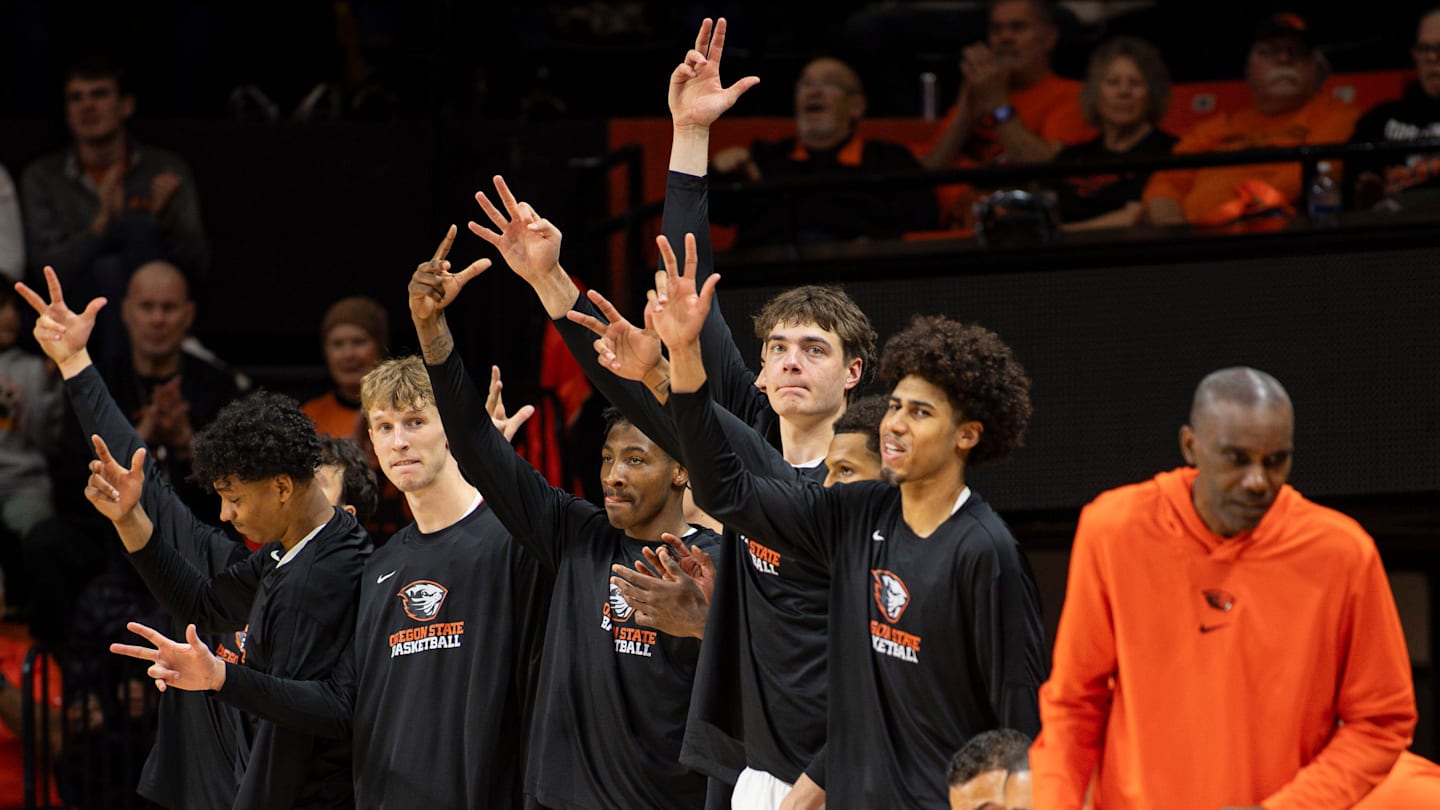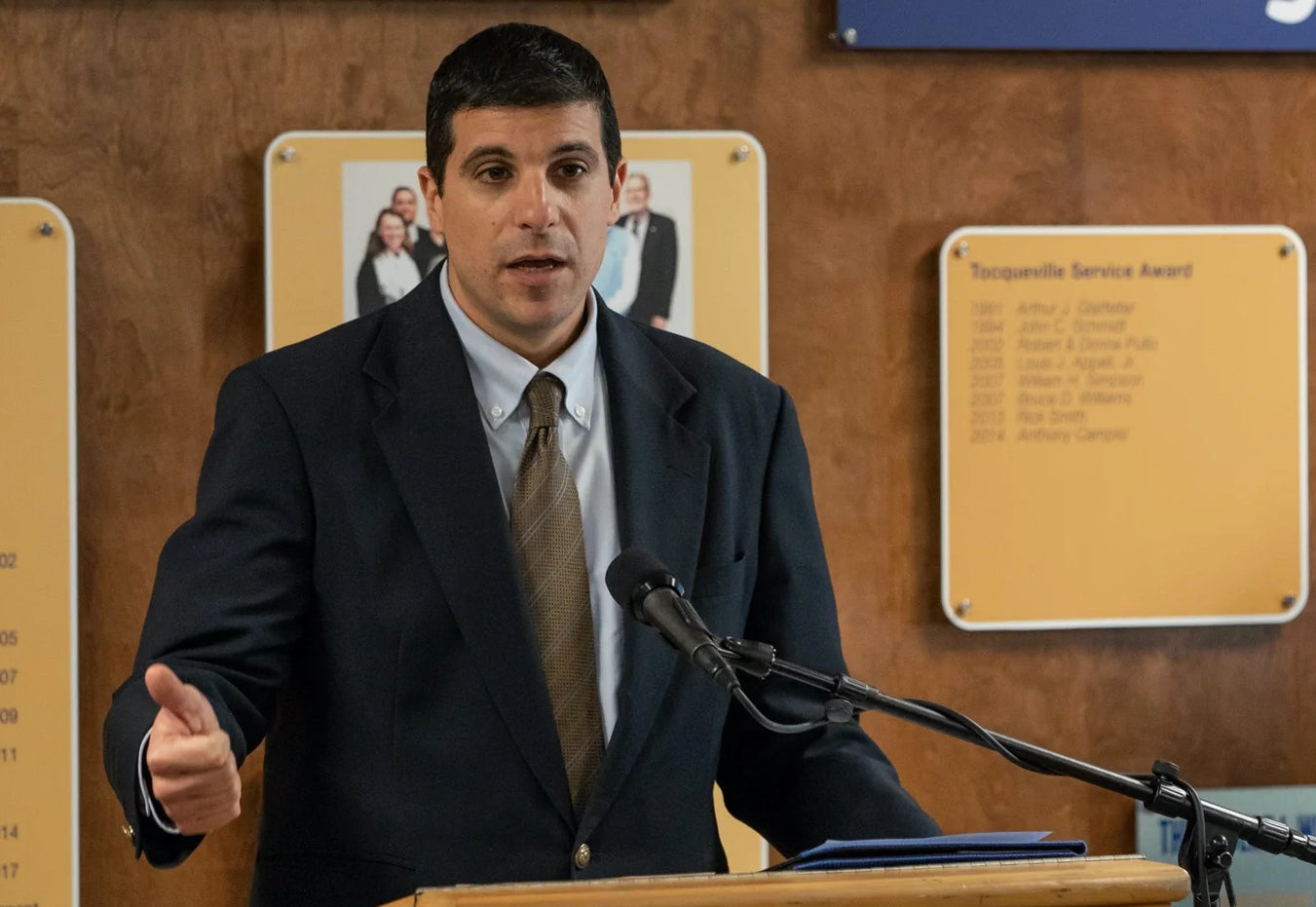Health
New Jersey dentists team up to give first responder a brand-new smile: ‘I feel more confident’

Two New Jersey dentists and other oral care professionals have teamed up to give a first responder the gift of a gorgeous new smile.
Dr. Jason Auerbach, CEO and founder of Riverside Oral Surgery practices, joined forces with Dr. Dayna Cassandra of DC Cosmetic Dentistry to form the Riverside Oral Surgery First Responders Initiative, which aims to “donate” restorative and cosmetic dental services to first responders.
Johnnie Ramos, a detective with the Passaic County Sheriff’s office in New Jersey, was the first recipient chosen to receive a new smile.
MAINE DENTAL PROFESSIONAL STARTS NONPROFIT, DRIVES MOBILE CARE TRUCK STATEWIDE TO SERVE THOSE IN NEED
“We’re very fortunate to be in a position to help people,” Auerbach told Fox News Digital in an on-camera interview. “And it made sense that if we were going to do something like this, that we would do it for people who put themselves in harm’s way to be there for others.”
He added, “Those are the people who deserve it the most, in my opinion.”
Johnnie Ramos, a detective with the Passaic County Sheriff’s office in New Jersey, was the first recipient to receive a new smile through the program. (Johnnie Ramos)
Auerbach and Cassandra, who have been practicing in the same neighborhood for 20 years, set out to organize a team of people who had complementary skill sets and a desire to help others.
Those included Dr. Jonathan Mendia, an anesthesiologist, and donation partners Straumann and Kuwata Pan Dent Laboratory, which manufacture dental implants.
When it came time to choose the first recipient for the initiative, Auerbach posted announcements on his Instagram accounts, @bloodytoothguy and @riversideoralsurgery.
“It’s really an art and a science.”
“We basically set out to seek interest and we found a lot of deserving people,” said Auerbach, who is also CEO and founder of MAX SSM, an innovative platform for oral and maxillofacial (jaw and facial) surgery.
BE WELL: STOP GRINDING YOUR TEETH FOR BETTER DENTAL HEALTH
“The unfortunate reality is that we can’t help everybody. So we kind of looked at the big picture and understood what was important about Johnny’s case, both the dental needs and who he is as a human being, and he was the one we selected.”
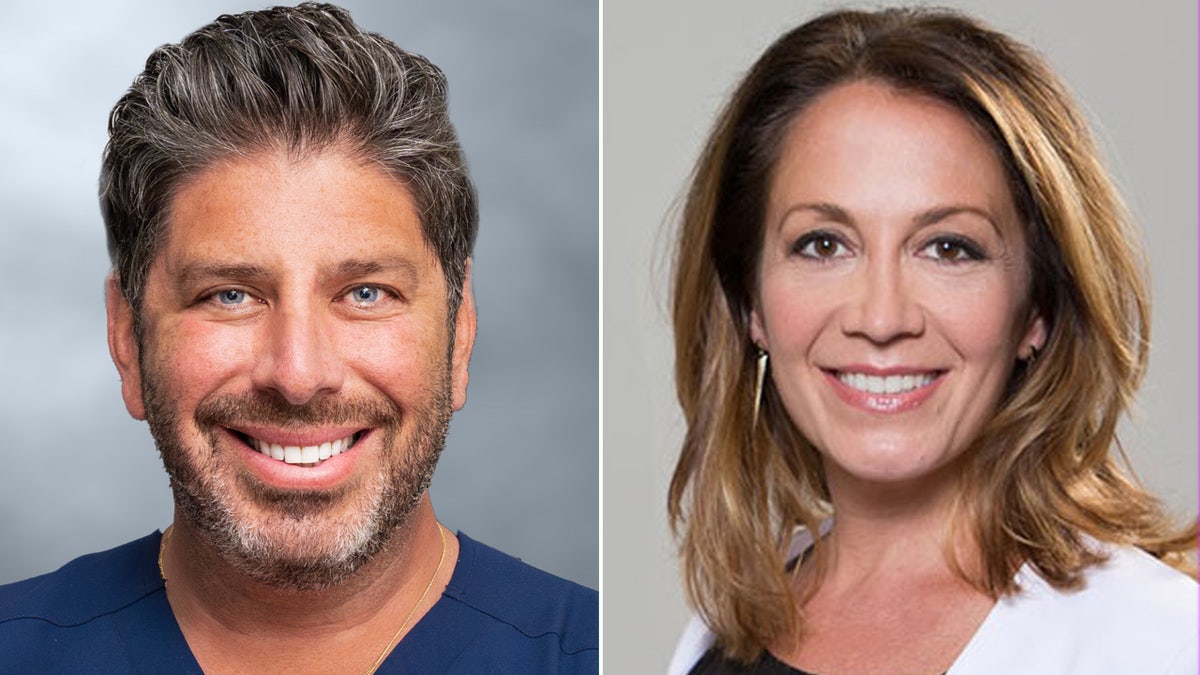
Dr. Jason Auerbach (left), CEO and founder of Riverside Oral Surgery practices, joined forces with Dr. Dayna Cassandra (right) of DC Cosmetic Dentistry to form the Riverside Oral Surgery First Responders Initiative. (Dr. Jason Auerbach; Dr. Dayna Cassandra)
Ramos has been a detective with Passaic County for nearly 31 years. He had a long history of poor dental health, which stemmed from not taking care of his teeth as a child.
“Since I was a little kid, I would eat a lot of junk food and not brush my teeth after every meal the way I should have,” he told Fox News Digital in an email. “I was also a smoker, which I now know was another problem.”
After having a bad experience early on, Ramos had a longtime fear of going to the dentist — so he admittedly “never went back.”
AI HELPS DENTISTS CATCH MORE CAVITIES AND GUM DISEASE: IT’S ‘UNBIASED’ AND GIVES ‘MORE ACCURATE’ DIAGNOSES
When he heard about Auerbach’s initiative to offer restorative dental work for members of law enforcement, he entered and was nominated for the SMILE program.
Through MAX SSM, Ramos received a full mouth reconstruction using several tooth implants.
The dentists started by performing a full analysis and 3D dental imaging of Ramos’ mouth and facial structures.
“The cosmetic aspect is dependent on the foundation,” Auerbach said. “The foundation needs to be strong in order to get to a point where the esthetics and function are good.”
Cassandra said she also likes to use regular photography and “old-school” techniques to complement the new digital technologies.
“It’s a combination of old and new,” she told Fox News Digital in the interview. “We marry those two things together in the laboratory and then deliver the treatment.”
“It made sense that if we were going to do something like this, that we would do it for people who put themselves in harm’s way to be there for others.”
“It’s really an art and a science,” Auerbach said.
Regardless of the cutting-edge technologies that are used, Auerbach pointed out that patients are still human beings — and that these procedures require a precise skill set and significant attention to detail.
After Ramos’ implants were placed, he received temporary teeth that are made of plastic and supported by tiny metal cylinders, Cassandra said.
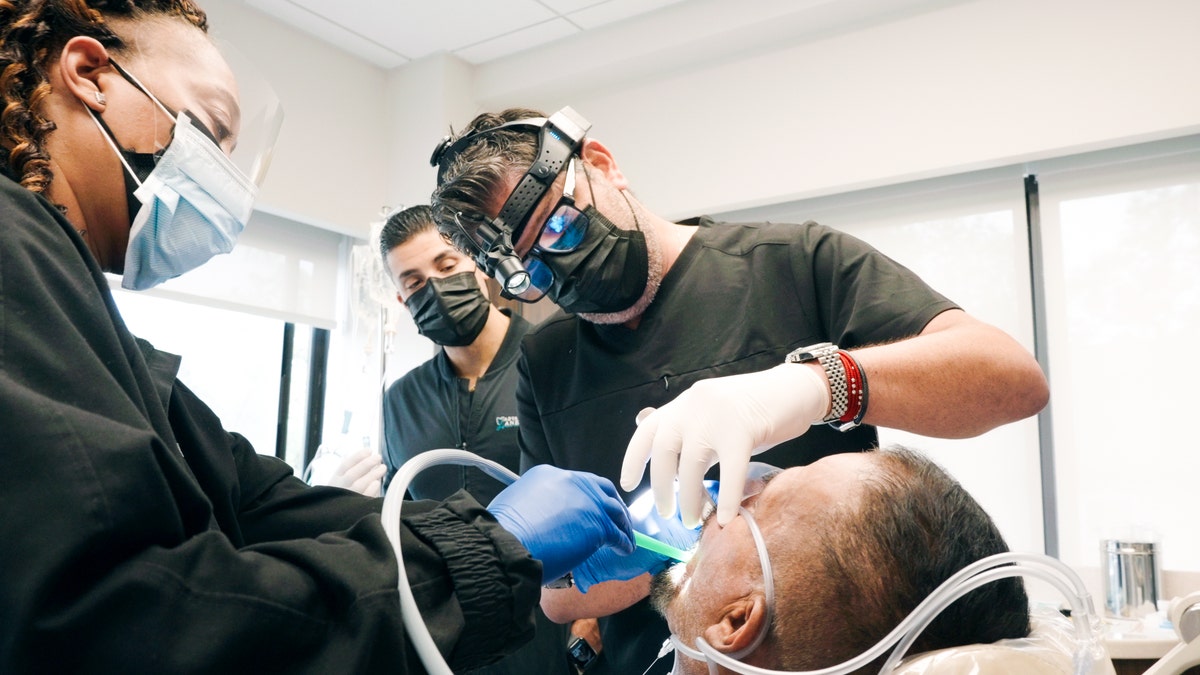
Dr. Jason Auerbach is shown working on a patient. “The cosmetic aspect is dependent on the foundation,” he said. “The foundation needs to be strong in order to get to a point where the esthetics and function are good.” (Dr. Jason Auerbach)
Once the implants are fully integrated and stable, the final restoration will be a milled piece of metal or titanium that’s made in Switzerland by the manufacturers of the implant.
“The precise fit of the teeth to the implants is what determines how successful they will be over the long term,” Cassandra said.
SURPRISING BRAIN BOOST: BRUSHING YOUR TEETH MAY REDUCE THE RISK OF DEMENTIA, NEW STUDY SUGGESTS
The quality of the implant is also important, the dentists noted.
Straumann, the Swiss dental company that donated the implants for Ramos, exercises “incredible attention to detail and precise connection, which is paramount to everything,” Auerbach said.
“It’s not really just implants — it’s the type of implant and the person placing the implant.”
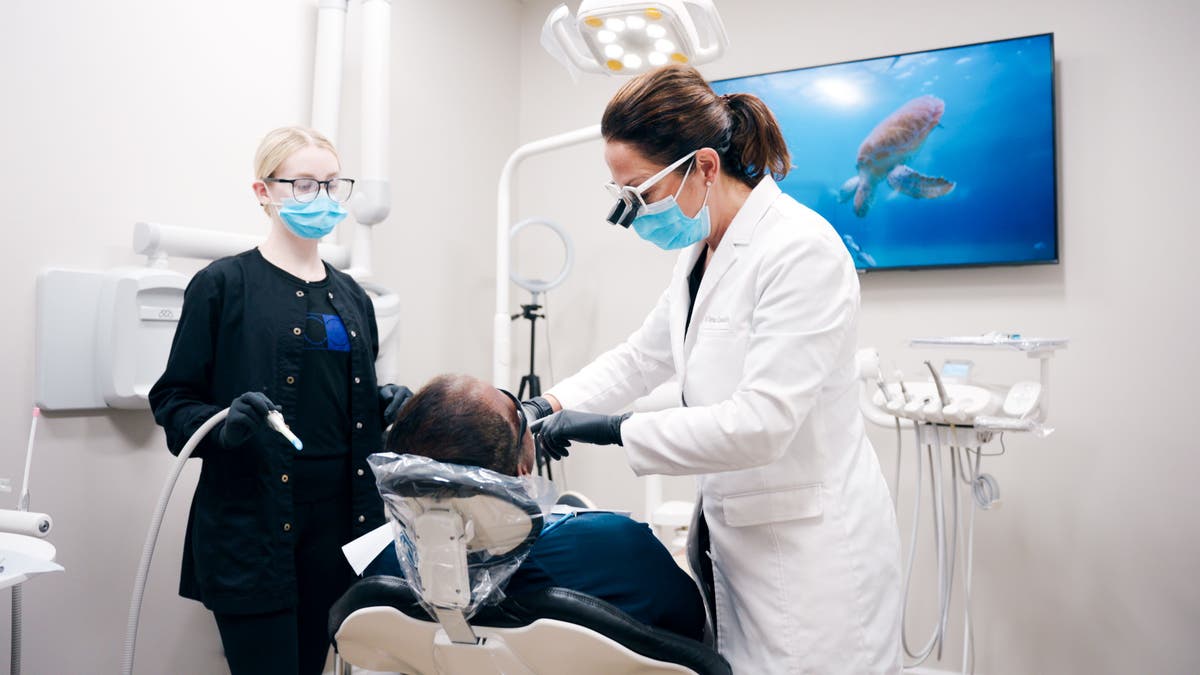
Dr. Dayna Cassandra (right) is shown working on a patient. “The precise fit of the teeth to the implants is what determines how successful they will be over the long term,” she said. (Dr. Dayna Cassandra)
Ramos is thrilled with the results so far, he told Fox News Digital.
“The process has been long yet comforting, and the doctors and staff made it very easy and smooth for me,” he said.
“Everyone was professional and did a great job in making me feel comfortable.”
Tips for maximizing dental health
To prevent tooth loss, decay and other major dental issues, Auerbach stressed the need to go back to the basics — following proper brushing and flossing protocol at home and regularly visiting a dental professional so that any issues can be caught and treated when they’re small.
“Little things don’t really cost that much if they’re caught and treated early,” he said.
If a cavity is left untreated, for example, it could eventually lead to a root canal or a crown — and if a tooth becomes infected, it may need to be extracted, which could then require a bone graft, implant and crown.
THESE ARE THE WORST DENTAL MISTAKES YOU CAN MAKE FOR YOUR TEETH
“The longer you wait to treat any problem, the more expensive and more burdensome it becomes,” Auerbach said.
It’s also important to choose the right provider, the experts agreed.
“The right dentist will be compassionate, skilled and knowledgeable,” he said.
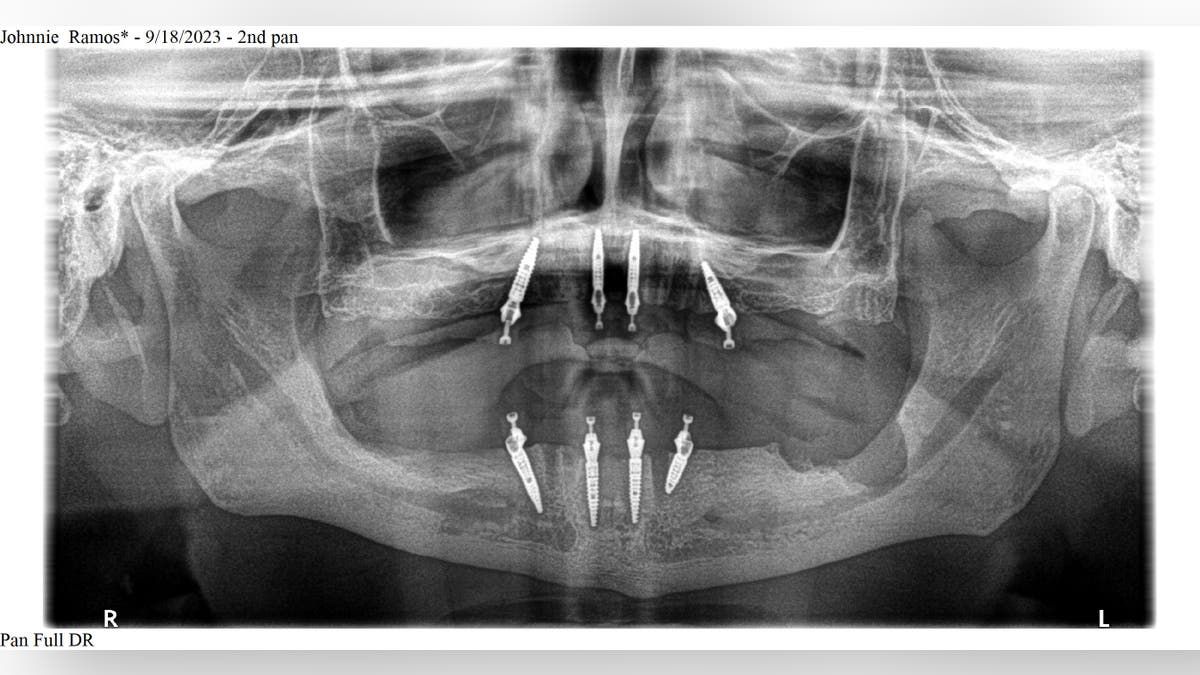
Johnnie Ramos’ X-ray is shown after his dental implants were placed. (Johnnie Ramos)
One of the main reasons that teeth break down, said Cassandra, is that people tend to breathe through their mouth — especially when they’re asleep.
Open-mouth breathing can dry out the gums and mouth tissue, which can increase the risk of gum disease and tooth decay, experts say.
“Mouth breathers often have periodontal disease and lots of decay,” she said.
‘DENTIST’S DREAM’ OF REGROWING TEETH ADVANCES TO CLINICAL TRIALS IN JAPAN, SAYS REPORT
“And once somebody has pain from gum disease or broken teeth, and then they have a bad experience, they don’t want to go to the dentist,” she said.
“They don’t even want to brush their teeth because it hurts. So it’s like a snowball effect. And I think that’s where it started with Johnnie.”
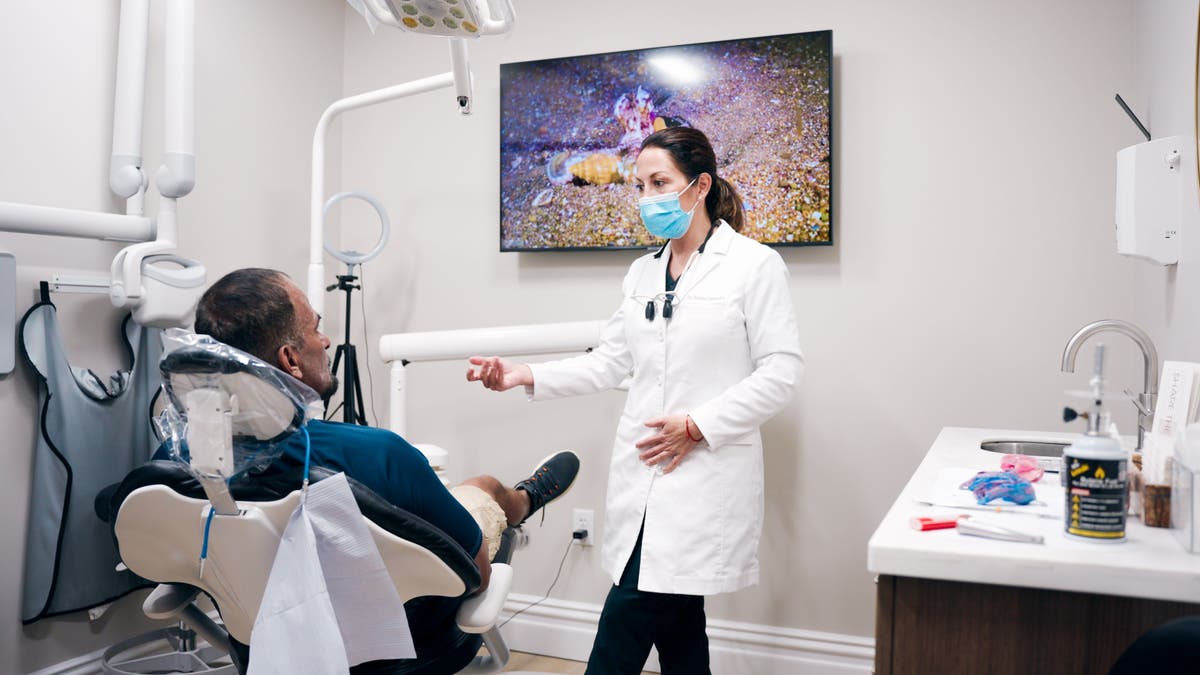
Dr. Dayna Cassandra is shown speaking to a patient in her office. (Dr. Dayna Cassandra)
Much of dental health has to do with awareness, Auerbach said.
“A lot of that comes from socioeconomic issues — patients who don’t have the best access to good health care or dental care when they’re younger tend to have less than optimal experiences,” he went on.
“It’s a privilege to be able to make a difference in people’s lives.”
In hindsight, Ramos agrees that prevention is key.
“You should brush your teeth after every meal, and floss, and see your dentist as often as possible,” he recommended.
CLICK HERE TO SIGN UP FOR OUR HEALTH NEWSLETTER
“I wish I had taken better care of my dental health when I was younger and that I had regularly seen the dentist.”
‘Reason to smile’
Ramos said that his new teeth give him a “younger look, which gives me an actual reason to smile.”
He told Fox News Digital, “The benefits have been amazing throughout my daily life — I’m able to smile more and feel more confident about myself.”
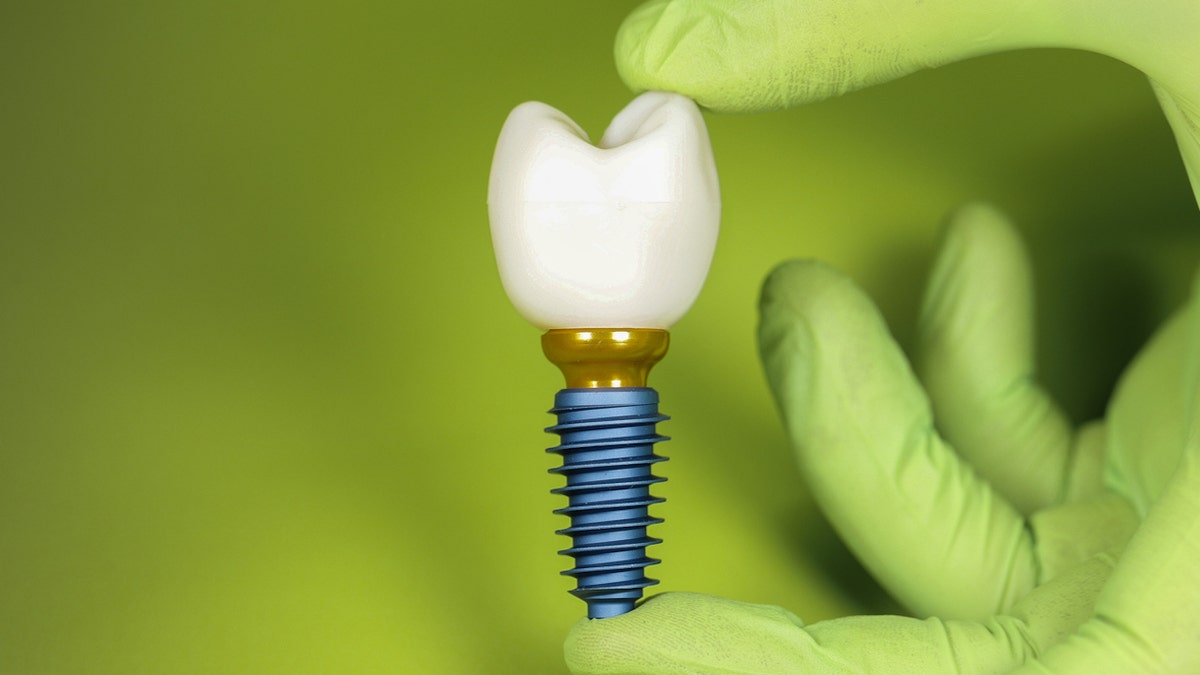
After Ramos’ implants were placed, he received temporary teeth that are made of plastic and supported by tiny metal cylinders, Cassandra said. (iStock)
In terms of how humans relate to one another, said Auerbach, “the smile is really everything.”
“When you meet somebody, you look either in their eyes or at their smile, or a combination of both,” he said.
“The smile is a universal language,” Cassandra added.
“Restorative dental work contributes to the physical health and well-being of patients — everything from eating and sleeping properly to reducing headaches and neck pain to helping with good posture and balance,” she said.
These types of procedures can provide a big mental health boost as well, she said, helping people live happier, more confident lives.
Looking ahead, Auerbach and Cassandra plan to perform one transformation each year through the SMILE initiative.
“We take it seriously,” Cassandra said. “It’s a privilege to be able to make a difference in people’s lives.”
For more Health articles, visit www.foxnews.com/health.

Health
Elderberry Boosts Weight Loss and Improves Blood Sugar, New Study Shows

Sign Up
Create a free account to access exclusive content, play games, solve puzzles, test your pop-culture knowledge and receive special offers.
Already have an account? Login
Use left and right arrow keys to navigate between menu items.
Use escape to exit the menu.
Health
Chicago's Lincoln Park Zoo loses flamingo, seal to bird flu

The Avian Influenza has claimed the lives of a Harbor Seal and a Chilean Flamingo at Chicago’s Lincoln Park Zoo.
The zoo announced they received results that confirmed the highly pathogenic Avian Influenza was the cause of Teal, a Chilean Flamingo, and Slater, a Harbor Seal’s death.
“This is sad news for wildlife and for the zoo team. Not only are we facing the first known cases of HPAI in animals in our care, but we’ve lost two amazing animals,” said Director of Veterinary Services Lester E. Fisher and Dr. Kathryn Gamble in a statement. “While highly pathogenic avian influenza is a naturally occurring virus in free-ranging waterfowl, more mammal species have been reported to be susceptible to HPAI since 2022.”
ONE STATE LEADS COUNTRY IN HUMAN BIRD FLU WITH NEARLY 40 CONFIRMED CASES
The zoo announced they received results that confirmed the highly pathogenic Avian Influenza was the cause of Teal, a Chilean Flamingo, and Slater, a Harbor Seal’s death. (Lincoln Park Zoo)
The zoo was unable to confirm the source of the exposure, but the Centers for Disease Control say that HPAI is spread through saliva, nasal secretion and the feces of infected birds.
They did say that zoo visitors are not at risk of contracting the disease from the animals at Lincoln Park zoo.
“Because highly pathogenic avian influenza is spread by free-ranging birds, it is no riskier to visit Lincoln Park Zoo than to enjoy a walk outdoors,” said President & CEO and ornithologist Megan Ross. “The zoo remains a safe place to connect with the animals in our care.”
BIRD FLU LEADS TO SEVERE HUMAN ILLNESS AND STATE OF EMERGENCY; EXPERTS DISCUSS RISK

The zoo announced they received results that confirmed the highly pathogenic Avian Influenza was the cause of Teal, a Chilean Flamingo and Slater, a Harbor Seal’s death. (Lincoln Park Zoo)
The zoo has been monitoring HPAI, so there is a response plan in place. The plan addresses staff and animals. It includes personal protective equipment and removing cross contamination between species while monitoring individual animal behavior, according to a statement by the zoo. They have also closed the McCormick Bird House and will be closed until further notice.

The zoo announced they received results that confirmed the highly pathogenic Avian Influenza was the cause of Teal, a Chilean Flamingo and Slater, a Harbor Seal’s death. (Lincoln Park Zoo)
The zoo also said in their statement that it’s important to keep personal pets indoors and away from wildlife.
“Sharing this news of highly pathogenic avian influenza in the area is important for our community at large,” said Director of the Urban Wildlife Institute Seth Magle. “To protect yourself, do not handle wildlife. Additionally, keep your pets safe by keeping cats indoors and dogs on a leash away from wildlife.”
Health
Insulin Prices Dropped. But Some Poor Patients Are Paying More.

Maricruz Salgado was bringing her diabetes under control. Thanks to a federal program that allowed health clinics that serve poor people to buy drugs at steeply discounted prices, she was able to pay less than $75 for all five of her diabetes medications every three months.
But in July, the cost of three of those drugs soared. Ms. Salgado, who does not have health insurance, suddenly faced costs of hundreds of dollars per month. She could not afford it.
Her doctor switched her to cheaper medicines. Within days of taking one of them, she experienced dizzy spells so severe that she said could barely keep up with her hectic daily schedule as a phlebotomist and an in-home caregiver. By the time she returned to the doctor in September, her blood sugar levels had ticked up.
“We were in a good place,” said Dr. Wesley Gibbert, who treats Ms. Salgado at Erie Family Health Centers, a network of clinics in Chicago that serves patients regardless of their ability to pay. “And then all the medicines had to change.”
The price hikes at the clinic happened for a reason that is symptomatic of the tangled web of federal policies that regulate drug pricing. In 2024, drug makers lowered the sticker price of dozens of common medications, which allowed them to avoid massive penalties imposed by the American Rescue Plan, the Covid relief package passed three years earlier. But that change backfired for low-income people like Ms. Salgado.
The decision to make these medications more affordable for large swaths of patients has quietly created another problem: a severe financial hit to the clinics that are tasked by the federal government with caring for the country’s poorest people. These nonprofit clinics operate in every state and serve nearly 32.5 million people, or about 10 percent of the country’s population.
“It’s the law of unintended consequences,” said Beth Powell, the director of pharmacy at The Centers, which operates five community health clinics in the Cleveland area. Ms. Powell said that while many consumers benefited from the companies’ decision to lower prices, “for our folks, that is not the case.”
More than 1,000 community health clinics around the country rely on a decades-old federal program that requires drug companies to offer them deep discounts.
Under the 340B program, as it is called, companies typically sell their brand-name drugs to clinics at a discount, at 23 percent or more off the list price. The same discount scheme applies to state Medicaid plans. But if a company raises a drug’s list price above the rate of inflation, a penalty kicks in, forcing it to offer even deeper discounts to the clinics.
For years, that meant that every time a company raised a drug’s list price above inflation, community clinics paid less for it. Many drugs, including insulin, essentially became free.
But the American Rescue Plan made a major change that hit drug companies with even larger penalties for raising prices. In January 2024, companies that continued to raise a drug’s price would have to pay state Medicaid plans every time those drugs were used, potentially costing the industry billions of dollars.
“That was a bridge too far” for the companies, said Antonio Ciaccia, a drug-pricing researcher who advises state governments and employers.
Manufacturers lowered the price of at least 77 drugs in 2023 and 2024, according to an analysis by a nonprofit that Mr. Ciaccia leads. The list includes widely used asthma drugs like Advair and Symbicort, as well as diabetes treatments like Victoza, which Ms. Salgado used before the change.
Once the pharmaceutical companies lowered their list prices, the inflation penalties evaporated. That meant community clinics had to start paying the usual discounts of 23 percent or more off the list price — far more than the pennies they used to pay.
“Unfortunately, the complexities of the U.S. health care system can reduce access and affordability for many,” Jamie Bennett, a spokeswoman for Novo Nordisk, which makes Victoza, said in a statement. “Even when we lower our prices, too often people don’t receive the savings — this is a problem.” She said the company also has patient assistance programs to make its products more affordable.
David Bowman, a spokesman for the Health Resources and Services Administration, which oversees the 340B discounts, did not respond to questions about how community health clinics were affected by the lowered drug prices. He said that other recent policies, including directing Medicare to negotiate the price of drugs, had lowered drug costs for low-income patients.
Because of a six-month lag in the way that 340B discounts work, clinics were hit by the change last July. Some clinics began calling patients before their prescriptions expired, offering to switch them to less expensive medicines even though they sometimes had more serious side effects. Others decided to cover the higher out-of-pocket costs, which required dipping into already scarce reserves.
Ms. Salgado said a nurse from Erie called over the summer to tell her about the pricing changes. Until then, she had paid about $15 for a three-month supply of Victoza, which is injected daily to keep blood sugar down. After July, the cost rose to more than $300.
After a few weeks, Ms. Salgado adjusted to the replacement, Byetta, and her dizziness subsided. But the drug must be injected twice a day instead of once. And Ms. Salgado must now use a special pharmacy 20 minutes from her house to qualify for the federal discount on the two insulin drugs she was switched to, the result of increasingly strict rules that companies are imposing on health clinics.
Ms. Salgado, who is 39, said she is determined to avoid the fate of her mother, who died of diabetes complications at 54. But keeping up with frequent pharmacy visits and medication changes is tough. “Sometimes it does get to a point where it’s like, I just don’t want to do this anymore,” she said.
The changes are also making it harder for community clinics to offer other services.
Under the 340B program, clinics buy the discounted drugs on behalf of their patients. When those patients have insurance, the clinics can then bill insurers for the regular, higher price, pocketing the difference. But now that spread — the difference between how much they pay for the drug and what insurance will cover — has dwindled. That has left clinics with less money to spend on services that are not otherwise covered by government grants or insurance, such as helping patients find housing.
At Valley View Health Center, a network of clinics that serves patients in rural Washington, the 340B money once financed a mental health program that employed eight therapists. In September, the clinic halted the program, laying off the therapists.
“It was such an abrupt change for us that it has definitely affected our ability to care for our patients the way that we needed to,” said Gaelon Spradley, the clinic’s chief executive.
Some patients who have seen costs go up have qualified for patient-assistance programs offered by drug makers. That was the case for Lorena Sarmiento, another patient at Erie Health who uses Lantus, an insulin pen. Last fall, after the 340B discount changed, she was quoted $490 at her pharmacy — the retail price for a box of insulin pens. Erie Health sent her to another pharmacy, which helped her sign up for a manufacturer’s coupon that lowered her cost to $35 per month.
Doctors and pharmacists at several health clinics said such drug-company assistance programs can be hit or miss. Sometimes they last for a limited time or require that a patient reapply regularly. Patients often have to be legal residents of the United States or have a fixed address.
“It’s a lengthy process, and it’s a lot of hoop-jumping,” said Michael Lin, the chief of pharmacy operations at Family Health Centers in Louisville, Kentucky.
Ms. Sarmiento and her husband, Luis, spend about $500 per month on her medical needs, including special food, medications and a glucose monitor. They are no longer facing the highest insulin price, but their costs are still 10 times what they were just a few months ago, when they spent about $10 on three months’ worth of insulin.
Mr. Sarmiento said he tries not to complain. “You always have to look on the good side,” he said. “But lately, that’s been hard.”
-
/cdn.vox-cdn.com/uploads/chorus_asset/file/25822586/STK169_ZUCKERBERG_MAGA_STKS491_CVIRGINIA_A.jpg)
/cdn.vox-cdn.com/uploads/chorus_asset/file/25822586/STK169_ZUCKERBERG_MAGA_STKS491_CVIRGINIA_A.jpg) Technology1 week ago
Technology1 week agoMeta is highlighting a splintering global approach to online speech
-

 Science5 days ago
Science5 days agoMetro will offer free rides in L.A. through Sunday due to fires
-
/cdn.vox-cdn.com/uploads/chorus_asset/file/25821992/videoframe_720397.png)
/cdn.vox-cdn.com/uploads/chorus_asset/file/25821992/videoframe_720397.png) Technology1 week ago
Technology1 week agoLas Vegas police release ChatGPT logs from the suspect in the Cybertruck explosion
-

 News1 week ago
News1 week agoPhotos: Pacific Palisades Wildfire Engulfs Homes in an L.A. Neighborhood
-

 Education1 week ago
Education1 week agoFour Fraternity Members Charged After a Pledge Is Set on Fire
-

 Business1 week ago
Business1 week agoMeta Drops Rules Protecting LGBTQ Community as Part of Content Moderation Overhaul
-

 Politics1 week ago
Politics1 week agoTrump trolls Canada again, shares map with country as part of US: 'Oh Canada!'
-
/cdn.vox-cdn.com/uploads/chorus_asset/file/23935558/acastro_STK103__01.jpg)
/cdn.vox-cdn.com/uploads/chorus_asset/file/23935558/acastro_STK103__01.jpg) Technology5 days ago
Technology5 days agoAmazon Prime will shut down its clothing try-on program



